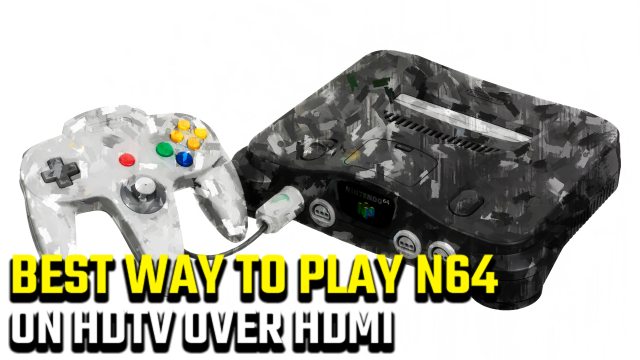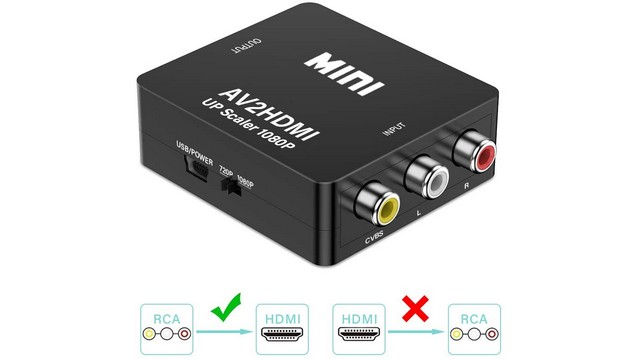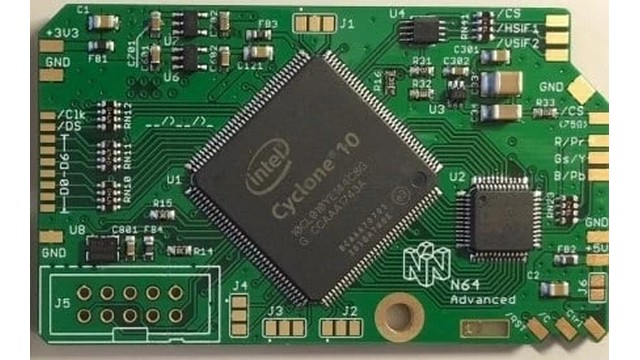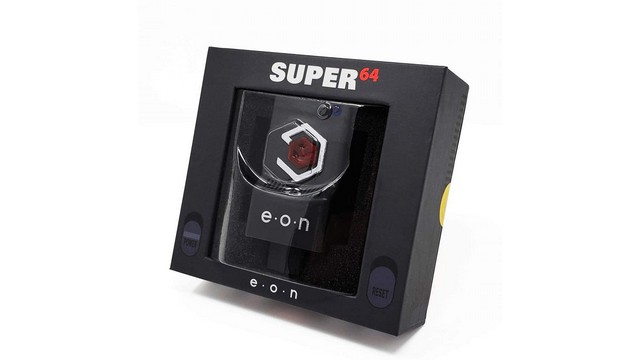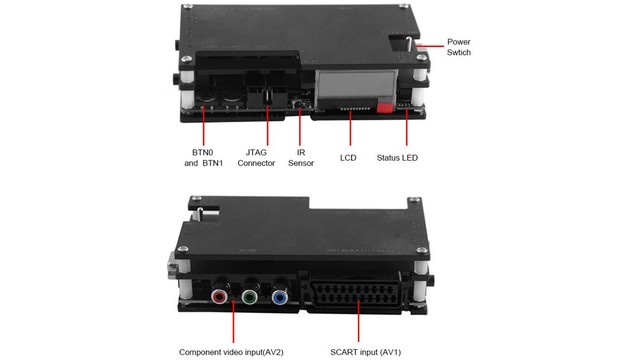Playing Nintendo 64 on an HDTV is a challenge. Out of all the mainstream retro consoles, the N64 is probably the hardest to get a decent picture out of when playing it on HDMI. Due to the way the system is made, you’ll either have to live with a blurry image or go out of your way to mod the N64 and clear it up.
We’ll go into solutions for playing the Nintendo 64 on modern TVs below. We’ll show you the best way to display your N64 on HDTV and go into why it’s so hard to get a sharp picture out of it.
ALSO: How to play SNES on HDTV | Play Super Nintendo on HDMI Modern TV
Why does the Nintendo 64 look so bad on modern TVs?
Most retro consoles from the fourth-generation on adapt pretty readily to modern TVs if you have the right equipment since they output RGB. Usually, all you need is the right cable and an OSSC or Framemeister, and you’re good to go. Unfortunately, the best you can get out of a stock N64 is S-Video, which, while better than composite, is still not ideal for upscaling and conversion to HDMI.
In addition to lacking RGB, the Nintendo 64 has some wacky features built-in that degrade picture quality on HDTVs. There’s a blur filter applied to games that is intended to help soften the jagged edges of polygons. This effect was arguably beneficial when playing on a CRT, but it’s terrible when you’re trying to upscale games on HDMI. Additionally, almost every game featured some sort of anti-aliasing that further muddles the picture.
While you can mod a Nintendo 64 to output RGB video, taking care of the internal filter and anti-aliasing is a bit tougher. Fortunately, the retro community has come together to research and create GameShark codes to disable software anti-aliasing. This helps picture quality a bit, but the hardware horizontal blur is where most of the issue comes from.
To get rid of the system-level filter, you need either an UltraHDMI mod, which is no longer in production, or one of Tim Worthington’s N64RGB or Borti4938’s N64 RGB Advanced boards. Both of these mods allow you to bypass the N64’s internal blurring, but as of writing, the N64 RGB Advanced is the only one you can actually purchase. The creator of the UltraHDMI is said to be working on Version 2 of the mod, but there’s currently no release date announced.
Cheapest Way to Play N64 on HDTV | Low-end Composite-to-HDMI or S-Video-to-HDMI converter
You can get a cheap Composite-to-HDMI (also known as RCA-to-HDMI) or S-Video-to-HDMI converter from Amazon for under $20. This is the most economical way to play your N64 on a modern TV but is also going to give the most inferior quality image (aside from RF to HDMI).
These cheap adapters output poor badly converted video with noticeable input lag and color bleed. This solution gets the job done, but the quality is so weak that it’s going to suck a bit of fun out of the experience of playing. I recommend this only for the sort of person who routinely watches standard definition 4:3 ratio content stretched to 16:9 and sees nothing wrong with it.
Most cost-effective way to play N64 on HDTV | RGB Mod and HD Retrovision Cables and GameShark (optional)
Many HDTVs are equipped with component input, which makes this method possible. You’ll find that newer, higher-end model TVs tend to be HDMI-only, so using this solution to play your N64 on HDMI works best on older or low-mid tier HDTVs.
There are multiple methods to mod an N64 to output RGB. If you have an early model N64 (identified by a serial number starting with “NS1” on US models), you can use a cheaper mod. If you have some basic soldiering skills, you can choose to build your own RGB amp by purchasing a SOIC-8 to DIP-8 PCB board and mounting a THS7316 3-Ch video amp to it (any variant is fine). The full instructions for installing a DIY amp can be found on RetroRGB (which is an excellent resource for all things RGB). The components for this mod will run you around $10 if you shop
A better option for modding an early N64 that costs a bit more is a pre-built RGB amp. I’ve personally installed Voultar’s THS7314 amp and built my own amp and found installing the pre-built model to be a bit easier and neater.
If you want more features or you have a newer N64, you’ll need to get either Tim Worthington’s N64RGB board or Borti4938’s N64 Advanced RGB mod. These mods require advanced soldering skills and aren’t recommended for beginners. However, these options include an FPGA that allows for features like on-screen menus, de-blur, and even line-doubling.
Regardless of which mod you choose to restore RGB to your Nintendo 64, if you’re trying to hook it straight up to an HDTV in the US, you’re going to need component cables, as SCART was never released here. HD Retrovision SNES cables work great with an RGB modded N64, and as long as you have a TV that has component inputs, you should get good quality video.
If you opted for the N64RGB or N64 Advanced boards, you’ll get a cleaner image with de-blur in effect. No matter how you choose to connect your N64, you’ll get an even better picture if you use an N64 GameShark and input the codes to turn off anti-aliasing. These codes must be entered per game, but can really make a difference when it comes to getting the sharpest image possible.
- Buy HD Retrovision SNES YPbPr Component Cable for the Super Nintendo on Castlemania Games
- Buy N64 RGB Kit on Voultar’s Mod Shop
- Buy N64 Advanced RGB Mod on RetroGamerStuff
The easiest way to play N64 on HDTV | Eon Super 64 HDMI Adapter
If you just want a decent picture from your N64 over HDMI on your modern TV, and you’re not interested in modding, a recently released product is just for you. The Eon Super 64 HDMI Adapter taps into the N64’s S-Video and converts it to HDMI. This small adapter fits in the video output of the N64 and requires no setup or hardware mods. Unlike cheaper S-Video to HDMI adapters, the Super 64 outputs a lagless conversion that upscales the picture to 480p.
The image you get our of the Eon Super 64 is roughly what you’d get from an N64 with a basic RGB mod over SCART. That means you won’t get the artifacting of a straight analog connection, but you’ll still see the soupy blur that plagues the system and likely some color bleeding. However, the Super 64 gives you the best picture you can expect to get from an unmodded N64.
The disadvantage of the Super 64 is the price. The adapter runs $150 and isn’t worth it if you’re willing to put any thought into getting the best picture out of your Nintendo 64. You can do a simple RGB mod on your N64 and get a set of HD Retrovision cables for around $70-80 and get a picture equal to or slightly better than what the Super 64 gives you. However, you can’t beat the Super 64 when it comes to ease of use.
Best value way to play N64 on HDTV | RGB, high-end converter, and GameShark (optional)
If you’re into retro gaming, your best bet is just to purchase a high-end video converter that you can use with multiple systems. The OSSC is the go-to converter for retro enthusiasts currently, and it works with various input types. So, you can RGB mod your N64, run it through the OSSC via either component or SCART, and output it to your HDTV and it’ll look great.
Of course, the output from the OSSC will look even better with de-blur from the N64RGB or N64 RGB Advanced and anti-aliasing off patches through a GameShark. One thing to note with this method, though, is that the OSSC doesn’t always play nice with HDTVs. You’ll need to make sure you set the converter up to output in a standard resolution. Otherwise, you might just get a blank screen on your TV.
- Buy OSSC on Amazon
- Buy Super Nintendo Entertainment System Compatible RGB SCART Cable by Insurrection Industries on Amazon
- Buy HD Retrovision SNES YPbPr Component Cable for the Super Nintendo on Castlemania Games
Best way to play N64 on HDTV | UltraHDMI mod
The UltraHDMI mod for N64 is the ideal way to play the console on HDTVs. Unfortunately, the mod is not currently in production, and it may be a long time before the creator releases the revision that’s now being designed. The N64 UltraHDMI mod captures digital video directly from the internals of the console and upscales it to 1080p and is practically lagless.
This is one of the harder console mods you can perform due to the fine pitch solder work necessary. The mod itself cost $165 when it was in stock, and paying for professional installation ran around $100. That means the UltraHDMI costs around $265, not including the price of shipping or the N64 console itself. However, if you’re a huge Nintendo 64 fan, the money is worth it since this mod gives you the best picture available from the console.
